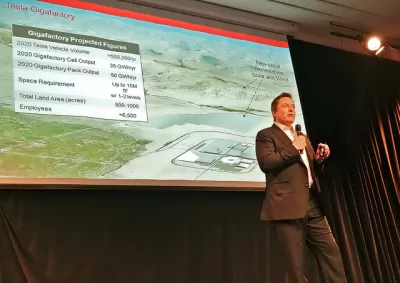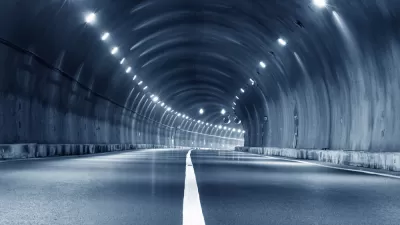Not all ideas are worth attention. What does the fact that ideas like Elon Musk's The Boring Company get so much attention say about the quality of civic discourse, or the potential for planning to improve the built environment?

Joel Silverman has written a scathing critique of Elon Musk's idea to create a company, The Boring Company, to build a massive network of tunnels that solves traffic congestion forever. More than a critique of the idea itself, Silverman addresses the implications of Musk's thinking on the subject of transportation and infrastructure development, as well as media and public's response to it.
Given that Musk himself admitted that he's devoting 2 to 3 percent of his time to The Boring Company, while interns and others work part-time on the idea, Silverman wonders why we should take the idea seriously. Silverman's interest in the subject has more to do with unpacking the threats inherent in Musks's impression of how cities should work and whom cities should serve:
Nowhere in his excited homilies to ultrafast underground travel do we hear anything about the role of mass transit in city life or the need to serve a public that includes poor people. Who decides where the tunnels go? Who pays to integrate the car elevators with existing road systems? Is building out a vast new infrastructure really the answer to traffic, especially when experience shows that adding more roads and highways tends to lead to more driving, exacerbating traffic?
The warning inherent in the argument throughout the article directs itself at planners in the conclusion. At a time when transit use is suffering, transportation network companies have burst onto the scene with little consideration of the consequences, and the oceans are rising as transportation modes continue to spew carbon into the atmosphere, should ideas like this really take time and energy away from planners?
See also: The Hyperloop.
FULL STORY: The Musk of Success, Choking Our Cities

Planetizen Federal Action Tracker
A weekly monitor of how Trump’s orders and actions are impacting planners and planning in America.

Restaurant Patios Were a Pandemic Win — Why Were They so Hard to Keep?
Social distancing requirements and changes in travel patterns prompted cities to pilot new uses for street and sidewalk space. Then it got complicated.

Maui's Vacation Rental Debate Turns Ugly
Verbal attacks, misinformation campaigns and fistfights plague a high-stakes debate to convert thousands of vacation rentals into long-term housing.

In California Battle of Housing vs. Environment, Housing Just Won
A new state law significantly limits the power of CEQA, an environmental review law that served as a powerful tool for blocking new development.

Boulder Eliminates Parking Minimums Citywide
Officials estimate the cost of building a single underground parking space at up to $100,000.

Orange County, Florida Adopts Largest US “Sprawl Repair” Code
The ‘Orange Code’ seeks to rectify decades of sprawl-inducing, car-oriented development.
Urban Design for Planners 1: Software Tools
This six-course series explores essential urban design concepts using open source software and equips planners with the tools they need to participate fully in the urban design process.
Planning for Universal Design
Learn the tools for implementing Universal Design in planning regulations.
Heyer Gruel & Associates PA
JM Goldson LLC
Custer County Colorado
City of Camden Redevelopment Agency
City of Astoria
Transportation Research & Education Center (TREC) at Portland State University
Jefferson Parish Government
Camden Redevelopment Agency
City of Claremont




























